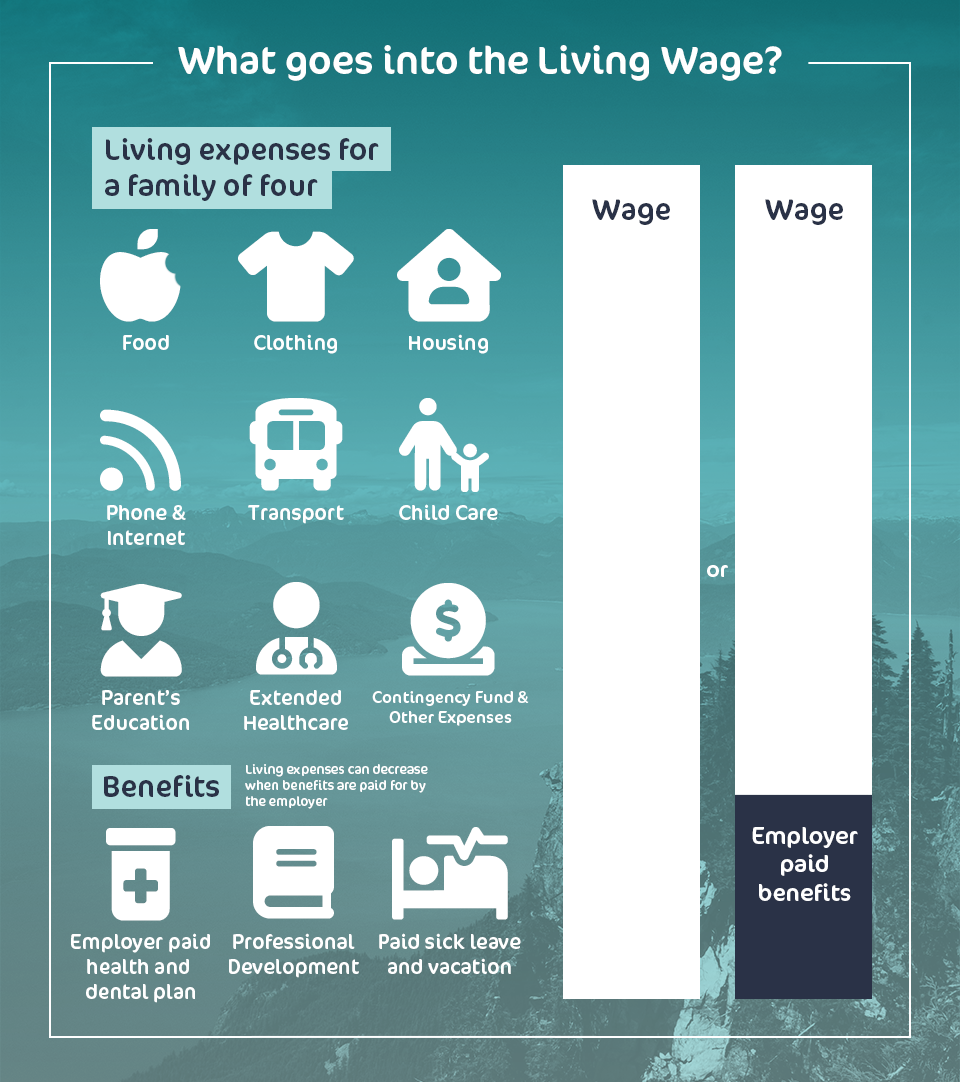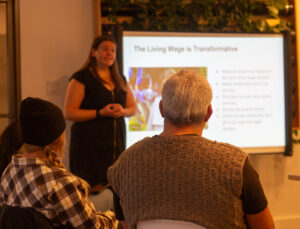Partner Spotlight Series Interview with Anastasia French, Living Wage for Families BC
By Sumaiya Tufail – September 30, 2024

Affordability is shaping up to be one of the hottest issues in the upcoming BC election, with the province grappling with the highest cost of living in Canada. For many working people simply making ends meet has become an ongoing struggle as rent and food prices skyrocket. Anastasia, from the Living Wage for Families BC program (a part of Vancity Community Foundation), has been at the forefront of tackling poverty through one crucial solution—ensuring that workers earn a wage that reflects the real cost of living.
Working alongside the Canadian Centre for Policy Alternatives (CCPA-BC), Anastasia’s team helps calculate the living wage, an hourly wage that enables workers to meet their basic expenses and avoid slipping into working poverty. In Metro Vancouver, that number currently stands at $25.68 per hour. But here’s the harsh reality: despite this progress, their research found that 1 in 3 people in BC still do not earn a living wage.
Getting Involved in the Fight for Living Wages
Anastasia’s passion for social justice started close to home.
“My first introduction to the living wage came from my mom, who was a living wage employer herself.” Her mother worked for a non-profit, and as the finance person, she made sure her staff, including contractors, earned a living wage. “That’s when I realized that poverty, which feels so vast, can be broken down into tangible actions. We all have a role to play—whether as employers, consumers, or citizens pressuring politicians to take action.”
The Affordability Crisis: Findings from Recent Research
“Affordability is an issue that’s affecting almost everyone” she explained. “The gap between the minimum wage and the living wage is growing, despite efforts to raise the minimum wage in BC.”

Their deep dive into the data uncovered some alarming truths. Half of all racialized women in Metro Vancouver earn less than a living wage. Nearly two-thirds of those who don’t earn a living wage are racialized, and 57% are women. On the other hand, only 25% of white men fall below the living wage threshold. This stark contrast reveals systemic discrimination that disproportionately affects women and people of color.
“The cost of essentials like housing and food has climbed even faster than inflation,” she added. “The minimum wage went up by 3.5%, but the living wage rose by 7%. The affordability crisis is real, and it’s hurting workers—and even businesses—across the board.”
Lobbying for Change in the Upcoming BC Elections
As BC gears up for its next election, the Living Wage program is pushing hard for change. Their demands to political parties focus on lifting wages and lowering costs.
“We want the minimum wage to be raised to at least $20 an hour,” Anastasia explained. “Right now, it’s $17.80, but that’s just not enough. We’re also calling for the BC government to become a living wage employer itself—imagine BC Transit, BC Liquor, health authorities—all ensuring their workers earn a wage that lets them thrive, not just survive.”
Beyond wages, Anastasia highlighted the urgent need for policies to curb skyrocketing housing and food costs. “We need more affordable housing, and protection for renters so that their rent doesn’t increase by 10-20% every time they move. Food prices are another story—they’re being driven up by climate change, supply chain problems and the big four grocery chains. Governments at all levels need to step in.”
Hopes for the Future
Despite the mounting challenges, Anastasia remains hopeful.
“Our goal is simple: close the gap between the minimum wage and the living wage. We want to make it easier for employers to pay their workers fairly and help alleviate the affordability crisis. It’s hard for everyone right now—workers, businesses—everyone is feeling the squeeze. We’re urging all political parties to address these affordability issues because it’s clear that something has to change.”
As the election approaches, Living Wage for Families BC continues to fight for a future where all workers earn a wage that reflects the true cost of living. It’s a fight for fairness, for dignity, and for a province where no one has to choose between rent and food.
